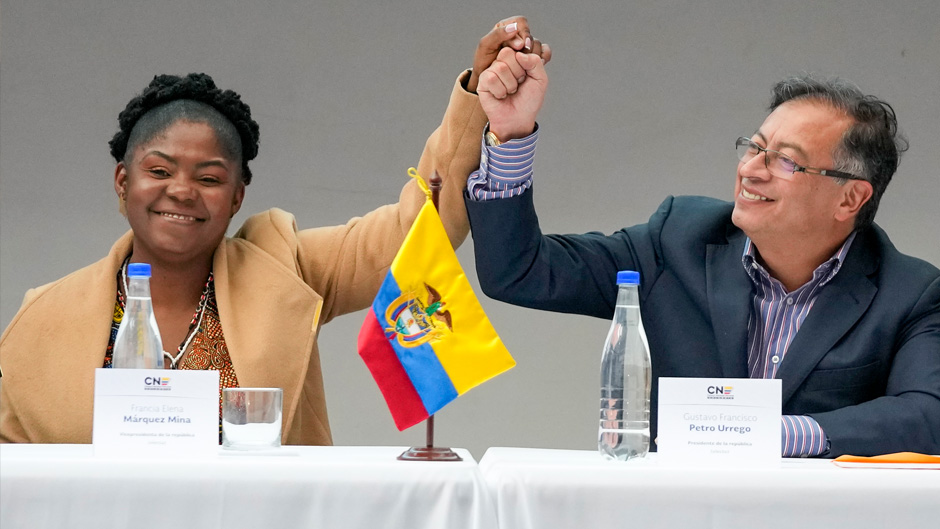In an unprecedented move, Colombia chose a leftist president to lead the nation. Gustavo Petro, a former guerilla and senator, won the June 19 elections. The victory also gave the country another first: an Afro-Colombian woman as vice president.
Political analysts credit the popularity of Francia Márquez—a human rights and environmental activist and lawyer—among the Afro-Colombian and other socio-politically marginalized groups as a major factor in Petro’s victory.
“Márquez has natural political instincts grounded in her sense of environmentalism and social justice,” said John Twichell, lecturer and director of Latin American Studies at the University of Miami.
Márquez, born and raised outside Cali in a rural community with a subsistence that depends on the Ojevas River, answered the call to environmental activism at the age of 13, joining a three-year-long successful protest movement opposing a nearby dam project, according to Twichell.
The dam project was being planned at a time when her own community relied on the Ojevas for clean drinking water, noted Twichell. “These sorts of contradictions she could not politically abide by and has remained steadfast in fighting them.”
“There is no doubt in my mind that she is a genuine person as we saw when she organized campaigns in defense of rivers and water cleanliness in her community,” said Colombian-born Joseph Ganitsky, professor of practice at the Miami Herbert Business School.
“Her background is solid and has been in defense of women’s rights and the rights of Afro-Colombians and others who are being ignored,” he added.
Márquez grew up poor in the Cauca region of Colombia, an area with the highest concentration of Afro-Colombians, a group that has been marginalized and discriminated against for decades.
She worked as a miner and a housemaid to support her son. She later obtained a law degree but continued to labor for the protection of her communities.
In 2015, Márquez led a group of Afro-Colombian women for 10 days and more than 300 miles from La Toma, in Cauca's southwest region, to the capital city of Bogotá to highlight the violence and environmental destruction done to her community by gold mining extraction. In 2018, she was awarded the prestigious Goldman Environmental Prize for her work.
"We've taken a very important step. After 214 years we've achieved a government of the people ... of those with calloused hands, of those on foot, of the nobodies,” she said in her victory speech after winning the vice presidency.
During the campaign, she had received more than a thousand racist comments on social media. Not only because she is Black but in regard to her class status.
Eliminating social and racial inequalities are at the heart of Petro’s political agenda. He has vowed to combat the poverty that affects 40 percent of the population, will increase taxes on the richest residents, and will establish a Ministry of Equality, to be led by Márquez.
“The ministry will focus on promoting greater access to education for all and providing primary and mental health services to marginalized groups, including those internally displaced by armed conflict,” said Twichell.
The new government is set on promoting environmental and social justice, which is not an uncommon policy agenda worldwide and therefore does not necessarily imply a turn to radical leftist modes of governing, such as in Nicaragua, Venezuela, and Cuba, Twichell pointed out.
Although a former member of the M19 guerilla movement, Petro was mayor of Bogotá and is an established politician who has built a strong political base, noted Ganitsky.
“It is yet unclear if Petro, at the end of his four-year mandate, will turn out to be an authoritarian or a strong defender of the democratic system that just elected him,” said Ganitsky.
“It will be difficult to destroy a country in four years,” he added. “Colombia has plenty of institutions to protect itself.”
Among those institutions is a diverse congress, where Petro’s party does not constitute the majority, and a Central Bank that is independent and outside presidential control, Ganitsky pointed out.
But governing will not be easy.
Another strong point in Petro’s agenda is to protect the environment. Colombia has a large amount of illegal mining operations that remain outside government regulation. Some of these operations are aligned to members of the FARC, a leading guerilla group.
“It will be interesting to see a leftist government stand up to this group,” Ganitsky said.
In order to carry out an agenda that protects the environment, the mining and oil industries would have to be closely monitored and perhaps curtailed. But oil exports bring in a large percentage of the government’s income, Ganitsky pointed out. Cutting back on oil exploration and drilling would cut back revenue.
“They are talking about protecting the environment. But how are they going to cover all the expenses of what they have promised the people, since that depends on oil and gas and coal mining?” he asked.
Márquez will also face personal challenges. She will contend with critics who will say she is not qualified because she has never held a political office, said Twichell. He expects that she will continue to face racist attacks.
But for now, Márquez’ election is a victory that resonates with hundreds of thousands of people that had felt powerless, said Twichell.
“It means everything to women and to Black citizens, because Márquez comes off as genuine and they see themselves reflected in her,” he said.

